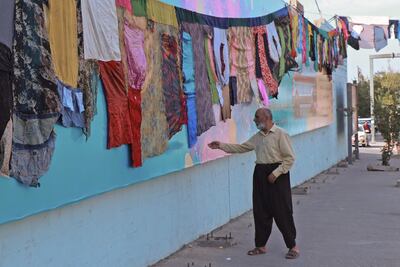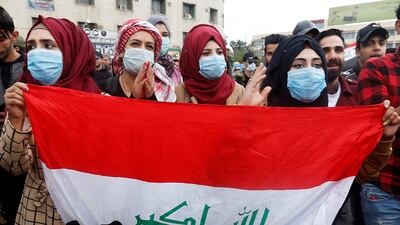Iraqi activists are urging the government to pass legislation against gender-based violence, as current regulations are so weak that they allow many men to escape punishment.
The country has been rocked by a string of brutal murders, including the killing last week of a two-month-old girl by her father because of her gender.
Soon after, a woman was killed by her father for refusing to marry the man he had chosen for her.
“Violence against women and children is increasing and this is not a new phenomenon,” Suhalia Al Assam, a women's rights activist and member of the Iraqi Women's League, told The National.
“There are many cases that have not caught the attention of the public and they are crimes that must be stopped.
“The country does not have a specific law to tackle domestic abuse.”
Iraq's criminal code outlaws violence within the family but does not specify consequences for domestic abuse, nor does it stipulate penalties for perpetrators.
“There must be no impunity. We have been demanding this for over a decade and no action has been taken. Hundreds of women have lost their lives to this issue,” Ms Al Assam said.
A draft law on domestic violence was tabled and debated in the Iraqi parliament in 2019 and 2020 but has stalled since then.
“It is devastating to see a father who killed his baby daughter because she is a female, when in reality his mother, wife, sister are all women. We have been fighting to pass this law for years,” she said.
Activists across the country believe that there are “people who are against this law, especially lawmakers, who have been blocking this from happening so they can always have power over women”, she said.
The absence of clear legislation on domestic violence allows some to get away with murder, Inas Jabbar, a member of the Iraqi Women's League, told The National.

“Criminals in Iraq have a safe haven as there are no legal, societal or humanitarian obstacles to stop the perpetrators from committing such crimes,” Ms Jabbar said.
For years, UN agencies in Iraq have expressed their concern over the rising number of domestic violence cases, especially during the Covid-19 pandemic and the two years that followed.
The passing of the draft law will not only protect women but Iraqi society, Ms Jabbar said.
“Perpetrators must be held accountable so that these cases can be stopped,” Ms Al Assam said. She added that crimes against women must be a priority for Prime Minister Mohammed Al Sudani's government.
A delegation of the Iraqi women’s network visited the holy Shiite city of Najaf and discussed these issues with high-ranking religious officials this month.
“We urged them to issue a fatwa against acts that harm women and we demanded justice for those that were killed or are on the verge of losing their lives,” she said.
The delegation also held talks with the women and children’s committee in parliament.
“We wanted to highlight the voices of women in small towns and villages who are oppressed and have no voice to protect themselves,” she said.
The women's rights league believes that more must be done to create change.
“We are still waiting and we don’t think these visits and meetings are enough to stop these violent and abuse cases from happening all over the Iraqi society,” she said.
Women must also have access to essential services and protection, although much of these violent acts are suppressed due to social taboos.
A recent survey by the UN have found that about 75 per cent of Iraqi women would not report domestic violence as a crime.
As for Iraqi men, 85 per cent said they would stop female family members from reporting such crimes.


